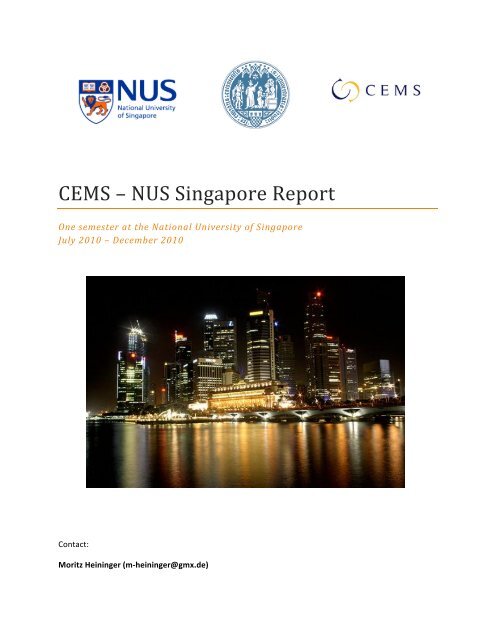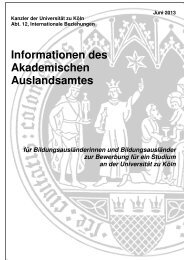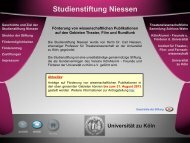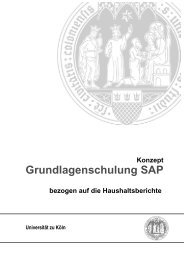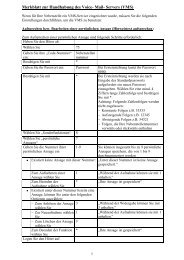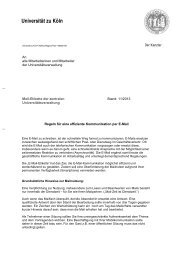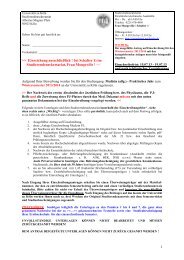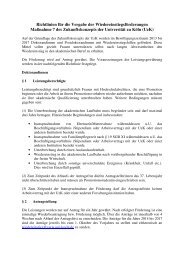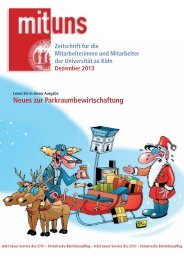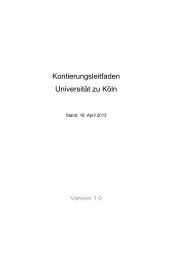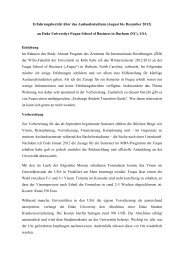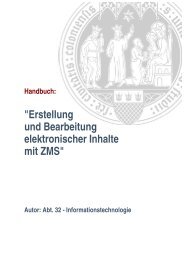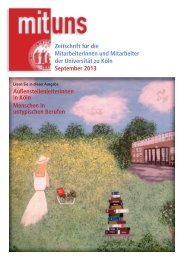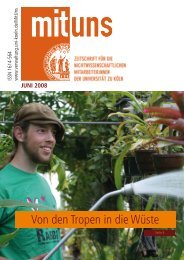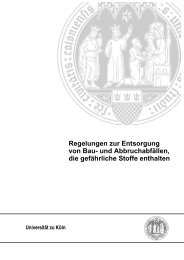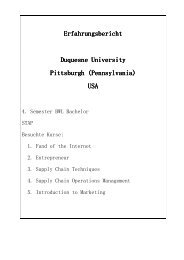Singapore_CEMS Report - Verwaltung
Singapore_CEMS Report - Verwaltung
Singapore_CEMS Report - Verwaltung
You also want an ePaper? Increase the reach of your titles
YUMPU automatically turns print PDFs into web optimized ePapers that Google loves.
<strong>CEMS</strong> – NUS <strong>Singapore</strong> <strong>Report</strong><br />
One semester at the National University of <strong>Singapore</strong><br />
July 2010 – December 2010<br />
Contact:<br />
Moritz Heininger (m-‐heininger@gmx.de)
Table of Contents<br />
Why NUS and <strong>Singapore</strong>?..................................................................................................................... 2<br />
First-‐class education ............................................................................................................................ 2<br />
A safe, exciting and multicultural city.................................................................................................. 2<br />
<strong>Singapore</strong> is your Gateway to Southeast Asia ..................................................................................... 2<br />
Administrative issues........................................................................................................................... 3<br />
Registration.......................................................................................................................................... 3<br />
Student visa ......................................................................................................................................... 3<br />
Accommodation................................................................................................................................... 4<br />
Bank account ....................................................................................................................................... 5<br />
Expenses .............................................................................................................................................. 5<br />
Insurance ............................................................................................................................................. 5<br />
Academic issues................................................................................................................................... 7<br />
Academic calendar............................................................................................................................... 7<br />
Welcome session ................................................................................................................................. 7<br />
Block seminar....................................................................................................................................... 7<br />
Skill seminars ....................................................................................................................................... 8<br />
Courses at NUS .................................................................................................................................... 9<br />
Career events..................................................................................................................................... 13<br />
Internship/jobs .................................................................................................................................. 13<br />
Life in <strong>Singapore</strong> ................................................................................................................................ 15<br />
Transport ........................................................................................................................................... 15<br />
Eat and drink...................................................................................................................................... 15<br />
Travel around..................................................................................................................................... 16<br />
Clubbing and pubbing........................................................................................................................ 16<br />
Shopping ............................................................................................................................................ 17<br />
Cultural activities ............................................................................................................................... 17<br />
Conclusion ......................................................................................................................................... 18<br />
1
Why NUS and <strong>Singapore</strong>?<br />
First-class education<br />
<strong>Singapore</strong> is at the forefront of economic and social development, not only in Asia but globally. NUS, the<br />
national university, offers unmatched exposure and learning through a completely new business faculty<br />
(1 year old building and facilities) and via extremely qualified staff (for example the macroeconomics<br />
professor is <strong>Singapore</strong>’s Chief Economist).<br />
NUS Business School places a high emphasis on entrepreneurship with some very interesting and<br />
practical classes being taught at the MBA level. I have had the chance to experience a class called<br />
Technopreneurship that was very interesting because of both the guest speakers (entrepreneurs,<br />
visiting professors from Silicon Valley, VCs and angel investors…) but also because of the final project<br />
which was a business plan that was presented to a board of potential investors. This class is a must if<br />
you are visiting NUS since the quality of the students there is also very impressive (double degree<br />
engineers from MIT, for example, were part of this class).<br />
English is widely spoken on campus, but you will also have a chance to learn Chinese, Malay, Tamil, and<br />
countless other languages spoken by the diverse student population. Unfortunately I did not have<br />
enough time to pick up a new language.<br />
Wireless Internet service is available everywhere on campus.<br />
A safe, exciting and multicultural city<br />
Watching people from all over the world, exploring <strong>Singapore</strong>'s bustling nightlife (rooftop bars,<br />
nightclubs, live music…), catching a 3 a.m. meal at one of the legendary food centers, those are some of<br />
the interesting aspects of living in <strong>Singapore</strong>.<br />
<strong>Singapore</strong> is an easy city to live in, bureaucracy is kept to a minimum and the size of the country makes<br />
it easy to move around to meet up friends for activities. Some of the biggest attractions are cultural<br />
ones and food has a special place in <strong>Singapore</strong>an culture because of the mix of ethnicities and as such is<br />
one of the most exciting aspects of the local experience.<br />
<strong>Singapore</strong> is your Gateway to Southeast Asia<br />
From <strong>Singapore</strong>, most regional destinations are only a couple hours’ flight away. In fact, traveling to<br />
many of the beautiful islands of Malaysia or Indonesia makes the perfect weekend trip.<br />
Many adventurous students travel to the ruins of Angkor Wat, explore the beauty of Ha Long Bay and go<br />
party under the full moon at Koh Phangan in Thailand. From <strong>Singapore</strong>, Asia is yours to discover.<br />
2
Administrative issues<br />
Registration<br />
As soon as you receive your acceptance at NUS, the <strong>CEMS</strong> coordinator will send you some emails with<br />
different information, which you need to read carefully. There will be a welcome package, and a set of<br />
usernames and passwords to use for your NUS student system – both IVLE and mySiS (the emails are<br />
very detailed and the process is quite easy to follow).<br />
My main contact for anything related to <strong>CEMS</strong> or NUS was Justin Eng (mscmgt@nus.edu.sg) who was<br />
very helpful and readily available for any help or suggestions.<br />
Student visa<br />
Some nationalities do need to obtain an Entry Visa before coming to <strong>Singapore</strong>, you can check that with<br />
your embassy. German students nevertheless can enter the country for one months without a visa. All<br />
students must get a Student Pass after entering <strong>Singapore</strong>.<br />
The student pass procedure is greatly facilitated by NUS. Below is the exact procedure as cited by the<br />
NUS website:<br />
“For incoming international students, the University will apply for a Student’s Pass Application Number<br />
on your behalf once you are offered admission to NUS. You will then be given this Application Number<br />
via email (as provided in your online application) to access the <strong>Singapore</strong>’s Immigration and Checkpoints<br />
Authority [ICA] web-‐based Student’s Pass Online Application and Registration [SOLAR] system to verify<br />
the accuracy of your information and submit eForm 16 online as part of your Student's Pass application<br />
procedure. Please ensure that you read and follow the instructions carefully in the SOLAR system before<br />
you proceed to verify your details in eForm 16. ICA will review and process your student pass application<br />
once you have submitted the eForm 16. More information on student pass application can be viewed<br />
here.<br />
Once the Student's Pass application has been approved, you will receive an In-‐Principle Approval [IPA]<br />
letter, which will be given to you during the registration exercise at NUS. If you are from a visa-‐required<br />
country, your IPA letter will be mailed to your address (as provided in your online application) as it will<br />
serve as a single-‐trip entry visa when you arrive in <strong>Singapore</strong>.<br />
Please note that candidates without the IPA will not be granted the Student’s Pass later. After your<br />
registration, your IPA letter will be stamped with the required period before you proceed to convert<br />
your social visit pass into a Student’s Pass.<br />
All incoming international students who are applying for Student’s Pass for 6 months and above are<br />
required to do a medical examination (details will be provided in your offer package). Please also note<br />
that Non-‐Exchange students are required to read at least 12 MCs worth of modules per semester or<br />
pursuing full-‐time research in order to qualify as a full-‐time student and be issued with a Student’s Pass.<br />
3
Please note that your offer of admission is conditional upon your successful application of your<br />
Student's Pass. “<br />
Accommodation<br />
This is for most students usually the by far the most time consuming task. As <strong>CEMS</strong>/Master’s/Diploma<br />
student NUS does not offer you on campus accommodation. They did offer a hostel type of dorm but I<br />
would not recommend you to take it because it is very far from the center (at least one hour) and about<br />
30 minutes from NUS. Also there is no air condition in the rooms , which I would definitely not<br />
recommend in <strong>Singapore</strong>.<br />
It helps to get in touch with an agent, say how many you are and your total budget and that you are<br />
short-‐term exchange at NUS (an agent that some friends have used was Grace Lee<br />
gracelee388@yahoo.com.sg).<br />
Facebook is always a great way to get in contact with your future fellow students and this way you can<br />
go on the apartment hunt together.<br />
I got lucky and found an apartment over Facebook. One of the Full Time MBA student’s was looking for<br />
two people to sleep in the master bedroom. Yes, you read correctly. Two people in one with a separate<br />
bathroom. The apartment was in a great condition, only 10 minutes walking or two bus stops from NUS<br />
and it had a swimming pool. Even though I shared a room, I still paid around 400 Euros a months. I<br />
ended up sharing a room with a Finnish guy who was also part of the <strong>CEMS</strong> program and we got along<br />
really well. Additionally four Indian guys lived with us who were all full time MBA students at NUS and<br />
we had a great time together.<br />
The rent in <strong>Singapore</strong> is very high so expect to be paying between 400-‐700EUR/months depending on<br />
your standards<br />
NUS is not in the center of <strong>Singapore</strong>, but rather on the western end of <strong>Singapore</strong>. You don't need to live<br />
on campus. Depending on your class schedule you can choose to live in the center (Lavender, Bugis...) or<br />
near NUS (Pasir Panjang, Commonwealth, Clementi, Normanton Park…). There is always a tradeoff. You<br />
have to decide for yourself whether you want to commute to school and live right in the party center or<br />
whether you prefer it the other way around.<br />
After you choose your accommodation along with your flat mates you will need the following:<br />
• First month rent<br />
• One month deposit<br />
• Copy of your student pass<br />
• Sign two copies of the contract (make sure to read the contract very carefully and point out any<br />
unclear clause, some landlords are very strict and picky and it pays to be completely sure of what<br />
you are renting and under which conditions)<br />
4
Bank account<br />
Again, here you will have two options depending on your home bank account. Some <strong>CEMS</strong> students had<br />
already agreed with their home banks to waive the ATM withdrawal fees (Citi, HSBC) and hence did not<br />
need to open a new account in <strong>Singapore</strong>. Be sure to check with your local bank prior to leaving, it also<br />
pays to tell them that you want these fees waived internationally not only in <strong>Singapore</strong> (as you might be<br />
traveling quite often around Southeast Asia).<br />
Finally, if you don’t benefit from any withdrawal fee waiver, you can easily open an account at a local<br />
bank. The preferred choices are DBS and POSB or CITI where it literally takes you 5 to 10 minutes, your<br />
passport and a minimum of 500SGD (c.290EUR) to open a short term student account, you can later<br />
close the account for a 20SGD (c.12EUR) closing fee (for an account lasting less than 6 months). CITI has<br />
some advantages in restaurants and bars because you get discounts quite often.<br />
Expenses<br />
Compared to your rent and partying, the other expenses in <strong>Singapore</strong> are not too high. Transportation is<br />
a bit cheaper than in German: about 1SGD (c.0.6EUR) per journey with the MRT and the Bus, and 10SGD<br />
(c.6EUR) for a taxi ride. Sharing a cab might actually be cheaper than taking the MRT!<br />
Food is really cheap in the food courts, especially on the campus, and you can have a good meal for<br />
4SGD (c.2.3EUR). Nevertheless some restaurants are really expensive! I actually did not cook one single<br />
time because you can get your food cheaper at food courts than buying ingredients and cooking for<br />
yourself.<br />
Travelling is quite cheap too, thanks to the numerous low cost companies operating from Changi<br />
Airport. You can have tickets for as cheap as 50SGD if you book them in advance.<br />
Only partying can be costly, since taxes on alcohol are very high. A drink in nightclub can easily cost<br />
20SGD (c.12EUR) and a concert ticket cost around 80SGD (c.46EUR). Cinemas and museums are a bit<br />
cheaper than in Europe.<br />
My monthly expenses:<br />
Accommodation = 750SGD<br />
Food = 300SGD<br />
Transportation (incl Taxis with night surcharge of 50%) = 150SGD<br />
Concert / Museum / Cinema / Parties = 300SGD<br />
Travel: depends on your travel standard and frequency<br />
TOTAL = around 2000SGD pet month (c.1200EUR)<br />
Insurance<br />
Every international student must take up the compulsory NUS Group Medical Insurance Scheme. The<br />
fee is 58.85SGD (c.35EUR) for each semester. It will be included in the mandatory Miscellaneous Fees of<br />
the student bill on a semester basis. Details of the scheme can be found here:<br />
http://www.nus.edu.sg/uhc/clinic/insurance/local&international.html<br />
5
Please note that not all health services are covered by the scheme so you may wish to enroll with a<br />
private health insurance organization that offers services not covered by the scheme (none of us has<br />
done this).<br />
It is advisable to take up travel insurance to cover things such as lost luggage or trip cancellation. The<br />
NUS Group Medical Insurance Scheme does not cover travel to and from <strong>Singapore</strong>.<br />
6
Academic issues<br />
Academic calendar<br />
Be very careful! The first semester starts very early in the year! Don’t plan long holidays during your<br />
summer. The <strong>CEMS</strong> Block Seminar started on the 2 nd of August, and the normal classes started a week<br />
after that!<br />
You will enjoy 1-‐week vacation, called the “recess week” or mid-‐term holidays. It took place at the end<br />
of September. A revision week is also planned at the end of the semester, before the final exams. The<br />
official end of the semester was the 5 th of December, but depending on the classes you took, it could<br />
actually end a lot sooner, I finished on the 18 th of November.<br />
Welcome session<br />
The school has arranged a welcome session for the <strong>CEMS</strong> students.<br />
Attendance for the session is compulsory for students doing their term in NUS as NUS will be sharing<br />
important information on academic and administrative matters etc. the confirmed business modules<br />
you will be taking in NUS (those indicated in your offer letter are only tentative); procedure for add/drop<br />
of modules, etc.<br />
It is an excellent opportunity to meet the incoming <strong>CEMS</strong> students and students from the NUS MSc<br />
(Mgt) & <strong>CEMS</strong> MIM Club and <strong>CEMS</strong> buddies (see below).<br />
The Master’s Club (<strong>Singapore</strong>’s version of the PIM&<strong>CEMS</strong> club) also organizes a social gathering for all<br />
<strong>CEMS</strong> students after the welcome session.<br />
The role of a <strong>CEMS</strong> Buddy will be to help you adjust to NUS life, whether it be showing you around<br />
campus, showing you to classes, or showing you where to hang out after-‐school hours. Conversely, the<br />
Masters Club will hold events for you and your buddies during the term to get you more immersed in<br />
the NUS and <strong>Singapore</strong> way of life. Some of these events will include attending the local festivals and<br />
trying out some local delicacies.<br />
Block seminar<br />
General information<br />
The Block Seminar at NUS was held from 2 -‐ 6 Aug (Fall term 2010) in NUS Business School itself.<br />
The daily schedule for the seminar was sent to you via email. There were also be some readings for the<br />
seminar. As part of the block seminar, NUS will be conducting an online self-‐profiling exercise using the<br />
Herrmann Brain Dominance Instrument® (HBDI), a well-‐established thinking styles assessment tool. You<br />
will receive the instructions to participate in this online exercise via email.<br />
7
The participation fee is 350SGD (c.200EUR) per student. Payment is by cash and in <strong>Singapore</strong> dollars<br />
only.<br />
For students attending the <strong>CEMS</strong> Block Seminar only, you have to make your own arrangement for<br />
accommodation.<br />
Important: Attendance for the Block Seminar is mandatory and you must complete the seminar before<br />
the start of your <strong>CEMS</strong> term in NUS or your individual host/home university.<br />
Seminar content<br />
The seminar offered was called “Managing Plurality: Self-‐Leadership In The Global Organization”<br />
This seminar is built around the perspective that management and organization in the 21st century is<br />
more than ever characterized by multiple rationalities rather than a singular rationality, and such<br />
rationalities are always context dependent. The ‘reality’ of organizational life is never simply ‘out there’<br />
presenting itself in a clear, self-‐explanatory manner, and thus, management is much more than<br />
acquiring linear prescriptions and systematic solutions.<br />
What better time to introduce this perspective of knowledge and learning than when students are<br />
thrown into a new environment, where, as cultural strangers, they will be forced to question the taken-‐<br />
for-‐granted?<br />
Skill seminars<br />
You will have the choice among many skill seminars. You need to validate at least 2 full days (1 ECTS<br />
credit) during your semester at NUS (you can however validate part of them in NUS and the outstanding<br />
credits later in Cologne).<br />
Here are a few examples of skill seminars offered during the fall term 2010:<br />
• Case Interview<br />
• Presenting with Confidence and Charisma<br />
• Ace your Finance Interview<br />
• Workshop on Fund Management (4-‐Part Series)<br />
• Nail the Interview (3 Part Series)<br />
• Brand Marketing Workshop<br />
• Workshop on Practical Investing (2-‐Part Series)<br />
• Doing Business in China<br />
8
Courses at NUS<br />
Obligations<br />
You will need to take 5 courses during your semester at NUS. You will be able to choose among a<br />
selection of around 15-‐20 courses, most of which are MBA classes. You will be able to audit many<br />
courses freely.<br />
Workload and assessment type<br />
The workload is very different to the workload at University of Cologne. In Cologne, you have a totally<br />
stressful exam period while the beginning can be quite quiet. At NUS, you have group works every week,<br />
exams every week, presentations every week and several case studies on top. Therefore there is work<br />
constantly and you never really have the feeling to be done with all of your work. Nevertheless the exam<br />
period is quite relaxing. In many classes you do not even have final exams. I took five classes and I only<br />
had one final exam for which I did not have to study for more than a day. It also highly depends on your<br />
choice of classes and the amount of effort you are willing to contribute in team tasks.<br />
Since most of the classes offered are MBA classes, the typical week will be divided into five 3-‐hour<br />
classes, and the rest of the time will be divided between teamwork and individual work. With that said,<br />
it is very easy to optimize your schedule to have long weekends and time for extracurricular activities.<br />
All class material is available online, be it slides, assignments, readings and videos. The class structure is<br />
also very different from Cologne, as the professor gives a lecture to a class of approx 40 students in a<br />
seminar type room, participation is encouraged and some classes are filmed and can be downloaded<br />
from IVLE.<br />
In terms of assessment, this very much depends on your classes, but there are broadly three types of<br />
assessments:<br />
1. Midterm/Final: For the more classical courses (Economics, Options and Futures, Finance…). These<br />
classes typically have some homework assignments, a midterm exam and a final exam<br />
2. Participation/Final paper: Some classes such as Negotiations are based on class participation and<br />
submitting a weekly journal and the final assessment in the shape of a final paper<br />
3. Participation/Final presentation: Other practical classes (Marketing, Technopreneurship…) take the<br />
form of a midterm and final presentation on PowerPoint (Business plan presentation)<br />
Course examples<br />
The following list of classes are the courses that I took at NUS. Very few specialized classes were offered<br />
to us as opposed to the ones offered at home. However most of the technology-‐oriented classes are a<br />
must since they capture the whole spirit of Asian entrepreneurship.<br />
You will have the opportunity to attend a lot of the offered classes during your first week at NUS and<br />
you will only need to make your final course choices by the end of the first week. I recommend you to<br />
attend as many classes as possible since it will give you a better snapshot of the course content and<br />
quality.<br />
9
Concerning language courses, I have not taken any in NUS. But some other students took Chinese<br />
(beginner level). NUS Business School currently offers the <strong>CEMS</strong> Test for Business Communication in<br />
English only (you will be notified of date, venue and fee via email).<br />
BMK5000: Strategic Issues in Marketing<br />
Instructor: Professor Ashok Charan<br />
Course description: This course prepares students for the role of Brand Management. It is taught in an<br />
application-‐oriented fashion through lectures, class discussions, case studies and a simulation exercise;<br />
with the objective of developing critical analysis and problem-‐solving abilities. It caters for the<br />
‘experience’ of managing brands through a simulation project called Destiny.<br />
Project Destiny, which spans the length of the course, provides for an appreciation of strategic issues in<br />
marketing. It trains and empowers participants to make better use of market knowledge for day-‐to-‐day<br />
marketing decisions. Participating teams take charge of an ongoing business for three years, develop<br />
business plans and take marketing decisions to enhance and grow their business.<br />
Lectures cover the key elements of the marketing mix with attention to the management and<br />
development of brands. They are laced with class discussions and case studies to rehearse and inculcate<br />
core marketing and business concepts. The lectures also provide for the understanding and application<br />
of market research.<br />
Course opinion: Mandatory <strong>CEMS</strong> class. This class can be a lot of work, the marketing game that spans<br />
over the whole semester will have students thinking and strategizing on a weekly basis. The game can<br />
get confusing as students are immediately thrown in the simulation without practice and pushed to<br />
make decisions with tight deadlines. Add to that 3 case studies, a midterm business plan presentation<br />
and final game wrap up in the shape of a management presentation. This course is the closest you can<br />
come to a real job, with data crunching, board presentations, drafting slides and thinking strategically all<br />
combined in one condensed semester. The only minus is that the lectures are quite slow and sometimes<br />
not really helpful for the game which as I said is sometimes very confusing (we have expressed this<br />
concerned to the professor who is working on implementing our comments in further sessions of the<br />
class).<br />
BMA5108: Technopreneurship<br />
Instructor: Professor Wong Poh Kam<br />
Course description: This course is intended for students with a strong interest in high tech<br />
entrepreneurship and aims to provide a hands-‐on introduction to the entrepreneurial process of<br />
discovering, evaluating and exploiting opportunities for launching and building scalable businesses in<br />
general and technology-‐ or knowledge-‐based ventures in particular. An integral part of the course is for<br />
the students to learn about the entrepreneurial process by developing a concrete business plan for a<br />
new venture. The course covers the essential elements of a viable business plan, including the<br />
translation of a business idea into a viable business model that creates, communicates and captures<br />
10
value in new or existing markets, developing effective go-‐to-‐market strategies, building an execution<br />
team, securing funding, and planning and executing growth and exit strategies.<br />
Course opinion: A must! Professor Poh Kam is very well connected, and throughout the course has put<br />
many of us students in touch with entrepreneurs, angel investors and other industry experts. A priceless<br />
advantage of this class which also ended with the business plan presentation in front of an impressive<br />
panel of VCs, serial entrepreneurs, angel investors and other industry experts. I strongly recommend this<br />
class. The assessment comes in the form of a final business plan submission, final presentation as well as<br />
mini assignments and participation in online class discussions.<br />
BMA5003: Financial Accounting<br />
Instructor: Professor Charles Shi<br />
Course description: The course stresses the theory of accounts, generally accepted accounting<br />
principles, and the interpretation of financial statements. The perspective of the course is that of<br />
managers and investors as knowledgeable users of accounting information.<br />
According to the course outline, after taking this course, students should:<br />
• Have a broad view of the role of accounting in providing information for financial markets.<br />
• Understand the fundamental accounting concepts, principles, the elements of financial<br />
statements, and the implications of management’s judgment and choice in accounting<br />
measurement.<br />
• Know how the principles of accounting may prompt opportunistic behavior by management to<br />
further their own gain.<br />
• Have basic competence to comprehend how accounting numbers are created and to analyze,<br />
synthesize, and evaluate accounting information in the context of concrete business problems.<br />
• Be aware of international differences in accounting and of multinational accounting problems.<br />
Course opinion: If you are a finance or accounting student: do not take this course. I went to the first<br />
session and according to the professor the focus of this course would be on the interpretation and use<br />
of financial information. I hoped to refresh my accounting knowledge and to get further insights on the<br />
interpretation side. Unfortunately this course was very basic and therefore very boring. Additionally I<br />
cannot recommend the professor as he had difficulties to answer many questions, his English is not very<br />
advanced and some answers he gave were just plain wrong.<br />
BMA5004A & BMA5016A: Management & Organization and Leadership in Organization<br />
Instructor: Professor Ho Beng<br />
Course description: This course examined the current and emerging issues and challenges that<br />
managers must resolve. Question the course addressed was: What is management, what are the<br />
theories and controversies? What are the current and emergent issues facing organizations and their<br />
implications on managing? What is the best theory on planning, organizing, ensuring, and leading that<br />
we can use to address current and emerging challenges? What are the practical steps that you can take<br />
11
when applying the most appropriate theories? Leadership and Self-‐awareness. Leadership, mindsets,<br />
change, and emotions. Leadership, teams, and influence. Becoming a leader. Helping others be leaders.<br />
As can be seen from the list of topics that I just gave, the course is divided in two separate parts. The<br />
first part is mainly about management in organizations. You learn with a textbook and you have to do<br />
weekly Multiple Choice quizzes. The second part is a lot more personal and is mainly about leaders and<br />
leadership in organization. As course preparation you have to take several psychological tests online to<br />
test your leadership style, thinking preferences, type of personality and so on. The course then focuses<br />
on the analysis of the results and helps you understand yourself, your strengths and your weaknesses a<br />
lot better. Also you get advice on how to use your strengths and how to work on your weaknesses in a<br />
leadership context. Part of the evaluation consists of a personal mission statement that you have to<br />
write for yourself and that forces you to think deeply about your goals and values in life.<br />
Course opinion: In the beginning I mainly took the course because I could transfer the credit to the<br />
University of Cologne. Also I was very skeptical about the notion that this class was going to be<br />
somewhat of a Psychology session. Also the professor seemed strange to me with his hyper temper.<br />
Nevertheless I have to say that I completely changed my mind and the course turned out to be one of<br />
the best courses that I have taken in my university time. While the first part was a little dull and the<br />
weekly MC tests annoying, the second part was really great because I got to learn a lot about myself.<br />
Also the professor turned out to be a very interesting, friendly, helpful and challenging person. I would<br />
recommend the course to anyone!<br />
BMA5002: Analytics for Manager<br />
Instructor: Professor Singfat Chu<br />
Course description: This course is, as you can expect from the name, highly analytical and focuses mainly<br />
on the various uses of Microsoft Excel. Many fresh graduates start their career as consultant / analyst<br />
supporting the Supply Chain, Marketing, Finance and HR departments to refine their processes i.e.<br />
making them more efficient, profitable and customer-‐centric. The course aims to prepare participants<br />
towards such jobs by equipping them with a scientific / analytical mindset, that is, informed<br />
management based on data, models and sensitivity analyses.<br />
The course consists of biweekly group assignment, individual exams and a final group presentation.<br />
Through case analyses and their presentations, students will gain exposure to:<br />
• Decision and Risk Analyses i.e. Systematic assessment of Strategies, Risks, and Payoffs using<br />
Decision Trees<br />
• Business Optimization Models i.e. how to allocate scarce resources effectively (e.g. Optimal<br />
Product / Advertising Mix, Revenue Management, Hub Location, BPO, Portfolio Optimization,<br />
Supply Chain Optimization)<br />
• Simulation for hard-‐to-‐analyse applications e.g. Cash Balance Management<br />
• Extraction and communication of information from data i.e. exploratory CRM<br />
12
• Forecasting via regression (e.g. analytical CRM) and time series models.<br />
Most of the time we worked with several Excel Plugins from the firm Pinnacle that we got to use for free<br />
for a two-‐year period with the mandatory purchase of the textbook.<br />
Course opinion: If you have an analytical mind, like to work in consulting or any other data driven job,<br />
this course is a must. Besides Technopreneurship, I think this was my favorite class. Basic knowledge of<br />
Excel helps a lot, but is not a necessity. You need to have a laptop that runs Microsoft Windows in order<br />
to participate in the class as the Pinnacle Plugins do not work with the Mac version. I am a Mac user<br />
myself, therefore I installed Windows over a virtual machine on my Mac to run Excel. The professor is<br />
not the most sympathetic person in the world, but the things that he teaches you are of great help for<br />
any future job!<br />
Career events<br />
As a leading Asian business school, NUS receives many local and international companies of various<br />
industries for recruitment presentations. The kind of companies that come to campus are incredible and<br />
nothing compared to the quality and frequency that you usually get at the University of Cologne. Here is<br />
a list of companies that presented in September: <strong>Singapore</strong> Stock Exchange, Royal Bank of Scotland,<br />
Goldman Sachs, HSBC, Covidien, Unilever, Jane Street Capital, BP, Philips, AT Kearney, Merill Lynch, DBS,<br />
American Express, Procter&Gamble, Nomura. Typically you are notified at the beginning of the month of<br />
all the recruitment presentations taking place with dates, times, venues (most happen at 6pm and you<br />
might have to skip some of your evening classes or part of them).<br />
Some of the presentations also have workshops organized by the companies (such as the BP trading<br />
game), which could lead to an interview for the workshop top performers. As a rule of thumb, the<br />
presenters rarely gather CVs at the end of the session and unfortunately you will be required to apply<br />
online through the regular channels. However it pays to take notes during the sessions so as to use the<br />
information you have gathered in your cover letter later.<br />
You will have to register via email or via TalentEDGE Portal (username and password provided to you)<br />
for each of the career talks, carry your CV and to come in business attire.<br />
Internship/jobs<br />
This is where I have found that NUS lacks effectiveness. Although it organizes many recruitment<br />
presentations by industry leaders, investment banks, consulting firms, audit firms, etc… the end result is<br />
still for the student to apply online or go solo through networking and personal research.<br />
Career counseling and CV critique can be done via appointment with Ms Wang Wai Yee (email:<br />
bizwwy@nus.edu.sg). However seeing her personally has proven quite difficult for <strong>CEMS</strong> students which<br />
have expressed frustration because of the non responsiveness of the career office when discussing job<br />
opportunities or taking appointments. Most of the classmates I have asked were not very satisfied with<br />
that service or its results.<br />
13
There is also no clear platform where opportunities are offered to students.<br />
During our stay, I have noticed that there was a willingness to improve our situation with regards to<br />
internship/jobs (by people like Justin Eng for example), however the problem is that <strong>CEMS</strong> students are<br />
not held to the same standards as MBA students by the administration and as such any real change<br />
could take more time.<br />
14
Life in <strong>Singapore</strong><br />
During your stay in <strong>Singapore</strong>, you will not only experience <strong>Singapore</strong>an culture but a blend of all Asian<br />
cultures be it in gastronomy, festivals, languages, traditions and much more.<br />
<strong>Singapore</strong> is significantly more expensive than other Southeast Asian cities, a lot safer, and very<br />
straightforward when it comes to transportation or any other day-‐to-‐day issue.<br />
Below I will expose some of the most important aspects you need to be aware of before leaving there<br />
and after you arrive.<br />
Transport<br />
Once you land in <strong>Singapore</strong>, you have two options for transportation, the MRT (the subway) or a taxi.<br />
The taxis all speak English (some of them better than others), be sure to have your address with you.<br />
The taxi fare will vary depending on time of day. There will be an “airport surcharge” of 3SGD. If you<br />
take the taxi at rush hour (8-‐10 am and 5-‐7pm) there is a meter surcharge of 35% and if you take it after<br />
midnight there is a meter surcharge of 50%.<br />
Generally, taxis are quite cheap compared to Europe, average taxi ride is 10-‐15SGD (c.7-‐8EUR) for very<br />
decent distances (15min ride), but again it depends on the time of day and your destination<br />
Finally it is important to note that <strong>Singapore</strong> and Hong Kong are the only places where the taxis are<br />
regulated and as such you do not need to bargain or negotiate. The fare on the meter is clearly<br />
displayed and it is illegal for cabs to overcharge or tout.<br />
For the MRT, you can only take the green line from the airport and you might have to change lines or<br />
switch to bus depending on your end destination. Be sure to prepare this ahead of time. It takes around<br />
1 hour and 20 minutes by public transport to arrive at NUS from the airport because it is located in the<br />
very east of <strong>Singapore</strong> while NUS is in the west.<br />
Public transport is easy and super efficient (buses and MRT). NUS Business school is served by many<br />
buses but no MRT -‐ bus 183, 10, 200...<br />
Tip: best website to get around is www.gothere.sg you can prepare all your journeys in advance. It has<br />
proven quite helpful for a lot of us.<br />
Eat and drink<br />
One of the best things in <strong>Singapore</strong> is Food and Drinks. You will find a huge variety of food: Indian,<br />
Malay, Chinese, Korean, Japanese, “Western”…<br />
15
Food Courts: most of <strong>Singapore</strong>ans don’t cook, but eat at the food court. Different stalls offer a huge<br />
variety of Asian specialties. Once you buy your meal, you meet with your friends at one of the common<br />
tables. Very cheap and convenient. On the Campus, food courts are very good and very cheap.<br />
Restaurants: you will also find a lot of restaurants, offering all kind of food. The prices are then more<br />
similar to what you can find in Europe, especially if you are in the nightlife district (Clarke Quay). Very<br />
good and cheap Indian food can be found in Little India.<br />
Fast Food: Usual fast food can be found all over <strong>Singapore</strong> (and even on the campus): KFC, McDonald’s,<br />
Wendy’s, Subway, Pizza Hut, … Most of these brands also offer home delivery, which can be useful since<br />
housing can be far from restaurants. 24/7 service is also available most of the time! You will also find<br />
some local fast food chains, like MOS burger and its famous “Rice Burger”<br />
Drinks: Drinks are usually purchased at a specific stall. A large choice of ice teas and iced coffees is<br />
usually offered, along with the delicious Milo (a malted chocolate milk). Vending machines offer<br />
everywhere very special kinds of drinks, such as Aloe Vera drinks and herbal teas. Most of them are very<br />
good. Alcohol is very expensive compared to the rest of the food and beverage. Some local beers are<br />
very refreshing but rather thin compared to German beers, like the Tiger beer.<br />
Travel around<br />
I cannot discuss here all the different destinations that you can visit. If you like backpacking, you will be<br />
in heaven! After all, you are not in <strong>Singapore</strong> just to study. After all, when do you get the chance to visit<br />
and experience so many different countries and cultures? Here is a list of countries that I have visited,<br />
some of them more than once: Malaysia, Indonesia, Macau & Hong Kong, Thailand, Cambodia, Vietnam.<br />
Many low cost airlines operate from Changi Airport: Tiger Airways, Air Asia, Jetstar, Cebu Pacific, Zest, …<br />
Register to their Newsletter to be informed of the discounts! You can also travel to Malaysia by bus. It is<br />
fast and very (very!) comfortable.<br />
In <strong>Singapore</strong> itself, a lot of natural reserve and parks make it possible to relax. A Nickname for<br />
<strong>Singapore</strong> is “The garden city”. The beachfront is not really “scenic” but you can enjoy cool barbecues<br />
there, and even try some cable-‐wakeboarding.<br />
Clubbing and pubbing<br />
Most of the nightlife is gathered in the city center, mostly around Clarke Quay (pronounced Klah Key).<br />
Parties are organized in nightclubs by Student’s unions and Expats. Register to the related Facebook<br />
groups to be aware of what’s going on. Best nightclubs are Attica, New Asia Bar & Stereo Lounge.<br />
You can also party in Sentosa, a <strong>Singapore</strong>an island dedicated to entertainment. A few clubs are to be<br />
found there, like the WaveHouse (where you can surf an artificial wave during your night), or Azura for<br />
very nice beach parties. In December, “Zoukout” festival is held on Sentosa with this year David Guetta<br />
and Tiesto playing.<br />
2 casinos are also available if you enjoy gambling. The most recent one, Marina Bay Sands, is impressive!<br />
16
Shopping<br />
Shopping is the favorite activity of <strong>Singapore</strong>ans. There are hundreds of Malls all over <strong>Singapore</strong>. The<br />
main shopping avenue, “Orchard Road” is full of them, and of luxury brands. Prices are similar than in<br />
Europe, but higher than in the rest of Asia. Still, you can find good deals, especially for Hi Tech goods at<br />
the Funan Mall, and all kind of goods (really anything you want) at Mustafa Center (open 24/7)<br />
Cultural activities<br />
<strong>Singapore</strong> is trying to develop its cultural life. The numerous museums are very nice (Asian Civilization<br />
Museum, <strong>Singapore</strong>an Art Museum, National Museum of <strong>Singapore</strong>…). But still, there is no exceptional<br />
exhibition, and <strong>Singapore</strong>ans are not very interested in arts.<br />
It’s quite the same for live music. A few bars, held by Europeans, offer live music<br />
(http://www.timbregroup.asia/) but apart from this, there is not much going on from a musical point of<br />
view. The only place for a kind of “underground culture” is the Substation (http://www.substation.org/)<br />
but again, it is nothing comparable to European cultural life.<br />
You can check TimeOut to know more about the cultural activities in <strong>Singapore</strong>:<br />
http://www.timeoutsingapore.com/and you can buy tickets online on Sistic: http://www.sistic.com.sg<br />
17
Conclusion<br />
I had the time of my life in <strong>Singapore</strong> and loved almost every minute of it. The people, the food, the<br />
university, the parties and the travels were just great. The <strong>Singapore</strong>an experience, like any other<br />
experience, is what you make of it. You can travel around or spend your time home. You can study only,<br />
or divide your time between studying and other activities. There is something for everyone and I have<br />
no doubt that you will find what you are looking for there, be it adventure, peace of mind, new business<br />
opportunities, new friends or simply a great time.<br />
I hope you find this report useful, I urge you to contact me if you have any additional question or<br />
concern.<br />
Best regards,<br />
Moritz<br />
Köln, 6 th of January 2011<br />
18


